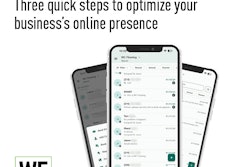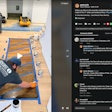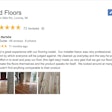I started out in the flooring business in California doing mostly sheet goods, prefinished hardwood and some carpet installation as a subcontractor for different stores, and along the way I also learned how to sand floors. I found out during this time that subcontractors are at the mercy of the store they work for as far as pricing, timely payments, scheduling, materials and job site control go.
In 1999, I moved to Pennsylvania, and when I restarted my flooring business, I decided I was going to focus on hardwood. I became a Lowe's subcontractor and also shopped myself around to different stores in our area. At about this time, my ex-partner in California invited me to an intermediate NWFA school and this opened my eyes to what was possible with hardwood. I had always enjoyed the more intricate work, so I then I decided that this type of work was what I wanted to do almost exclusively. The Main Line area of Pennsylvania where I live, in the Philadelphia suburbs, is pretty well-off, with middle- and upper-level income people who can afford the better hardwood work, and I decided I would target these customers.
I tried some magazine ads, but they were very expensive and not that effective. In 2002, I decided to do a home show (which I thought was way too expensive at $1,800) and built some pretty intricate floor panels, put together some sample racks, and framed a bunch of 8-by-10 pictures. As it turns out, it wasn't too expensive, and home shows like that are the main way I've been able to build my business.
Now, I do one home show in the spring and one in the fall, and I'd say 40 to 50 percent of my work comes directly from those two shows, not to mention all of the referral work that still rolls in from previous home show jobs I've completed. I still get the standard sand-and-finish work from the home shows, but the high-end panels and different species ignite people's imaginations—they realize that I can do some really nice floors. Currently, I'd say 75 percent of my business is higher-end work.
I don't have a complicated system for gathering leads at the show—I'm on hand to talk and give out advice and have business cards available. I don't aggressively try to get people's contact information unless they want me to contact them. Then, I schedule myself light for the first week or two after the show so I can do the necessary follow-up, and the calls from the shows trickle in over the course of a few months.
Of course, just showing high-end products at the home shows doesn't guarantee you'll get the high-end business. I really focus on providing great, honest service to clients. If they want to see a sample of a species I don't have, I'll order a bundle of it and make them a sample. That sounds expensive, but it only costs about $60, and they appreciate the effort. I hold their hands and help them with every step of the design process. Although I don't have a design background, after doing this for awhile I have a good feel for what will fit well in a room. I use my portfolio and photos in Hardwood Floors to help clients look at designs, and if they see something they like that's too intricate or expensive for them, I'll work to achieve the same look in a simpler way. For example, if they can't afford a fancy medallion that looks like an area rug in the entryway, I'll create a double-border box that has the same effect.
Another thing I do consistently to help build higher-end work is install some sort of custom pattern in the dining room when I do a bigger job. If it's a really big job, I'll even throw it in or only charge for materials. Even if it's just a simple walnut border, it goes a long way toward differentiating my business. People don't realize that it's pretty simple to do, because it makes such a dramatic impact. I get a lot of referral work from those add-ons, and the referrals are mostly for higher-end jobs.
When working with those types of customers, it's important to be easily available on e-mail. Higher-end customers tend to be extremely busy and Web-savvy. They work long hours and appreciate it when you make things easy for them, so it helps if you respond to e-mails right away and send them links to helpful Web sites.
These days, I still work for three Lowe's stores, but that work is only about 10 percent of my income, and I have a good subcontractor to take care of most of those jobs for me (although I still enjoy some days where we just install wood without having to worry about the finishing). What I enjoy the most, though, is that I've slowly been able to build my business toward a direct customer relationship and away from working for a store. These days, I can control the job better, give much better service, and get referrals for any work directly back to my company.
BUSINESS BRIEFS
Role Modeling
Like it or not, you're the role model for your employees. What behaviors should you be modeling?
Honesty: One instance of dishonesty on your part calls everything you say into question.
Trustworthiness: Respect confidences, keep all your promises, live up to your commitments.
Integrity: Do the right thing. You know what this means.
Fairness: No playing of favorites or taking advantage of others. Be especially careful with family members.
Consistency: Deal with similar situations in similar ways.
Dependability: Can they count on you to do what you said you would. To follow through. Every single time.
Organization: Be on time and well prepared.
Stability: Keep an even keel—no mood swings or tirades.
Approachability: Be as available to your people as you'd like them to be with you and your customers.
Positive attitude: You don't have to walk around grinning like an idiot, but upbeat and optimistic is good.
Jayme Broudy is the founder and principal of Contractor's Business School. More information is available at www.contractorsbusinessschool.com or 800/527-7545.






























